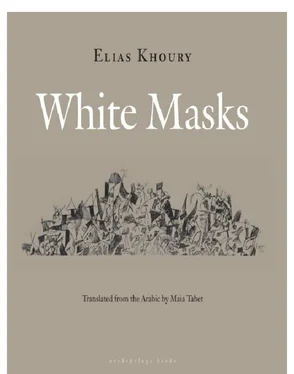Everyone nods in agreement.
“We were merely doing our duty. Should we allow the posters of our war heroes to be defaced? You yourselves know the value and importance of their sacrifices: if it weren’t for them, none of us would be here, today; if it weren’t for them, you wouldn’t be able to sleep in your own beds; if it weren’t for them, your homes would have been overrun and you would have been driven out of them; if it weren’t for them, we would have been subverted from every tenet of our religion and faith. How could we let the posters of our martyrs, our war heroes, be torn down? You know how precious such pictures are to the relatives and friends of the dead, don’t you? Didn’t Khalil himself exhibit an almost passionate concern for his son’s posters? Didn’t he come to me over two years ago with a request to print another batch?”
The wife butts in to say that that was true — he always wanted there to be pictures of Ahmad hanging on the walls.
Abu Jassem continues.
“You see, even though Ahmad died four years ago, his father still wanted to see the pictures of his son kept on the walls. What should we tell the parents and relatives of the new martyrs? Should we tell them that their loved ones’ posters are being torn down? How could we? It would be unacceptable. Will the revolution last forever? No, of course not. Speak up, if you think otherwise.”
“No, no, of course not,” everyone replies.
Mr. Munir Itani, an old friend of Khalil’s, is getting quite worked up and he proclaims that the revolution is there to protect the walls and that the walls are there to protect the people. But then he glances over towards Abu Jassem and asks the comrade when he thinks all this will be over.
“When all what will be over?”
“This calamity. . This war. .!”
“It’s going to be a long war, our enemies want to see us vanquished, and resistance is necessary. We are resisting by all the means at our disposal: we are fighting in the South, we are on a war footing in Beirut, and for the sake of the resistance we must try and lead as normal an existence as possible.”
One of the mourners — Khalil’s wife doesn’t know his name, he’s one of Ahmad’s old buddies from the sports club — mentions the various protection rackets and other abuses of power.
“It’s intolerable, Comrade Abu Jassem,” he says.
“Absolutely. .! We will not tolerate such practices, and you must help us uncover them. Name anyone extorting protection money and I will take care of him.”
No one says anything.
“Well, why don’t you speak up?”
“Oh, no reason, no reason,” says the deceased’s son-in-law. “We were speaking in general, there’s no need to go into particulars.”
Abu Jassem picks up where he left off.
“But in order for life to return to normal, schools, restaurants, and movie theaters all must reopen, everything should be operating normally. We have a duty both to resist and to go on with life. Do you think we should let people tear down advertisements and posters from the walls on a whim? People came and told me they’d seen a man doing just that. Should we just have sat there and done nothing? Maybe the man had been planted in our midst, we didn’t know it was Khalil, may he rest in peace, so we took him in for questioning. We made public pronouncements about the return to normalcy and here was someone who was hampering the process. It’s a fact, everyone is getting back down to business, offices and restaurants are reopening, the situation is improving, and there’s no need for people to feel any kind of pressure.”
“Well, what about the shelling then?” someone asked.
“That’s not our responsibility. . you should ask someone else about that. Our responsibility is to look out for ordinary citizens to an even greater degree than for ourselves!”
“But all we see are politicians in fast cars, living it up like the rich, while we grow poorer by the day.”
“Nonsense! You find me a pauper, and I will find him an honorable job.”
“But what about the politicians, then. .?”
“What’s wrong with them? Ask me, I should know. By God, they don’t even have enough time to eat! Ensuring their protection is absolutely essential. . security precautions are indispensable in the current circumstances.”
Abu Jassem drones on, and the people let themselves be convinced. That’s what people want — to be convinced that there’s a reason for all this, that their fortitude, long history, and good reputations are not in vain.
“I will not let Khalil’s murder go unpunished, I will discover the guilty party, and then we’ll see. But we won’t forget that Abu Ahmad died a martyr’s death, and a family that can offer up one of its own is capable of any sacrifice or act of generosity. Unto them is paradise promised. ‘Think not of those who are slain in the way of God as dead. Nay, they are living. With their Lord they have provision.’”
Abu Jassem rises to take his leave. Everyone stands up respectfully, even the deceased’s wife who, as the person befallen by tragedy, would not normally stand for anyone in such circumstances. One of the women wishes him every success.
Someone else asks the wife a question about the whitewash story; she denies everything:
“Nothing but lies! The captain assured me it was nothing but lies and gossip.”
“Then, who killed him?” Nadeem, the son-in-law, asks.
“Degenerates. . a gang of degenerates, that’s who.”
“Really. .!”
“Everything’s possible these days.”
“It is a sign of the times,” the wife says.
“It is the wrath of God, as we near the Day of Judgment, the end of times,” says the sheikh sitting in the corner of the living room.
The fact is Abu Jassem doesn’t have the time for this kind of thing.
His obligations now discharged, he has dropped the case — although he was never anything but courteous to Khalil’s wife, on her periodic visits to the party office. Still, tongues are wagging that he’s traveling to Europe rather often these days. Fahd Badreddin thinks he goes on missions. Others say that his stump has become very painful again and that he goes for treatment. And the malicious say he goes for rest and recreation.
“But where does he get the money from?”
“Oh, money’s not an issue! Beirut is awash with money.”
“But the Arabs don’t grow oil, so where does it keep coming from?” Fahd asks.
“You’re so naive,” a brash eighteen-year-old fighter answers him. “God blessed us with oil so we could be rich.”
“But it is our plague!”
“Well, without it there would be no war,” eighteen-year-old Sami goes on. “Don’t you understand, it is oil money that bankrolls all the factions in this war.”
“And that’s why we don’t want it,” Fahd says.
Sami smiles: “I don’t know what’s happened to you. People say you were traumatized in the mountains.”
Mrs. Nada Najjar, 28, the deceased’s younger daughter, wife of Nadeem Najjar, mother of two young children, aged five months, and five years, respectively, and a resident of Aysheh Bakkar. Her husband runs a pinball arcade on nearby Independence Avenue. Nada Najjar is tall, dark, and full-bodied, with small close-set eyes. She’s considered to be highly intelligent as she went all the way through high school, graduating with a Baccalaureate in the Sciences. She did not pursue further studies. She married Nadeem, a family friend who was a member of the same sports club as her brother, Ahmad. Unlike Ahmad, however, Nadeem never enlisted in the Joint Forces. Seven years Ahmad’s senior, he owned a business, which he hoped to transform into a large trading house one day, and he was married. This is what he repeated to Ahmad whenever the subject of taking up arms was broached. Nadeem was categorical about it: he was not prepared to die “just like that,” as he put it. This rift in their views caused a noticeable cooling in the men’s relationship.
Читать дальше












